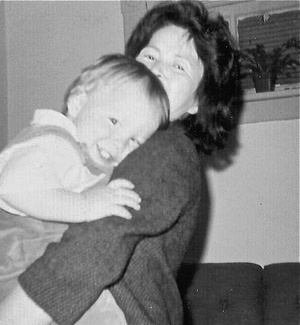When I was a boy, I felt disconnected from the kids in Northern Michigan. I played with Star Wars action figures and Japanese robots, creating intricate storylines inside my head about galactic invasion. Sometimes, I flipped through manga my parents brought back from Japan, even though I couldn’t read kanji yet.
I showed up to school dressed in a Miami Vice outfit (my classmates taunted me, a few threatened to beat me up for “being a pussy”). I also played soccer and pretended I was a spy. On Saturdays, I went to my Obāsan’s trailer and played Mozart and Sakura on her piano until she sang along.
One year, I dressed up as a samurai for Halloween. Another year I was a ninja. In junior high, I crushed on girls quickly when they smiled at me in the hallway and always had a girlfriend. I regularly daydreamed about living in Tokyo and having robot guardian angels. I spent hours by myself at home after school and on weekends, playing Atari games and old school RPG’s on the family PC. I wrote pop songs on my synthesizer and biked through the neighborhood by myself, pretending I was in the Tour de France. Sometimes, I chanted itadakimasu before meals like my mom showed me to.
Once, I even brought a Japanese medallion to class for show and tell. When I started to explain that my family was nikkeijin, the teacher told me to sit down.
Because I loved long baths, I didn’t take my first shower until I was in sixth grade. One of my favorite meals growing up was Sapporo Ichiban ramen. My mom would add raw eggs, kamaboko (fish cake), nori, shaved bonito, and scallions to the broth, transforming the meal of poor college students into a perfect Japanese dinner for four.
The language we used to talk about family was also different. On my mom’s side, my family had Japanese names that rolled off my tongue: Yukiyo, Eikichi, Chie, Shizuko, Hideo. My obāsan had a thick accent when she spoke. Sometimes, I had to translate her English to waiters. My beautiful hapa mom occasionally wore a Tina Turner wig to work, just for kicks. My dad made Jackson Pollock t-shirts in the backyard with a toothbrush and acrylic paint, which he later sold at our store on Front Street.
In so many ways, my life was straight up different and I was more than just another Nisei after school special. For most of my life, I wanted to understand how much of me was based on how I looked to the rest of the world and how much was based on who I was inside, including the Asian part no one could see (which, by the way, is the entire premise of my second novel, The Ninjas of My Greater Self). As it turned out, confusion was the easy part of being a secret American otaku.
I didn’t understand until much later that like my family, I’d always been different, and that my difference was one of the coolest parts about me, emancipating me from the fairytale of cultural normalcy before I even got started.
As an adult, I slowly realized that being both Hapa and a (secret) nerd gave me the space to negotiate my own cultural, racial, professional, and gender identity: I was equal parts Asian, American, and European, committed writer and accidental heartbreaker, rebel and romantic, klutz and athlete, sensualist and intellectual, pretty boy, musician, inconsistent vegan, gamer, permanent student, and travel junkie. I was the very face of cultural hybridity, even though it would take me years to understand this.
One of the first things I learned as a nerd (acting like a non-nerd) is that violence is not intrinsically masculine even though we still construct masculinity in precisely that way. In America, “being a man” is still synonymous with enduring hardship, locking down emotions, and using physical strength to resolve conflicts. But this (culturally relative) definition is destructive because it simplifies—and in fact, rejects—the inherent complexity of masculinity, ignoring male interiority altogether.
Our default definition of masculinity is almost entirely physical and external, which is deeply problematic (not to mention insulting). In the ‘80s, the nerd was the anti-male archetype, the skinny, zit-faced dweeb in thick glasses wearing ugly cardigans and pocket protectors. The nerd was always that dude getting thrown into locker and slapped around by Paleolithic jocks in the alley.
But the ‘80’s nerd and the Asian otaku have collectively paved the way for the transgression of our default gender roles, helping us to subvert cookie-cutter gender templates and also expand the repertoire of masculinity in 2013: look at the fashion icons of the 2000s, the metrosexual MCs in tight jeans busting out lyrics in rap videos, the NBA ballers in huge plastic frames answering questions in playoff news conferences, the NASA geniuses building remote control rovers for space exploration, the trope of the cyberpunk in sci-fi lit, the elevated status of tech gurus and musical hipsters, the advent of socially-conscious gaming, digital whistleblowing, and hacktivism as political ideologies.
The point is that the operative definitions of masculinity (and the professional sectors where men are represented in large numbers) are changing from exclusively physical/external definitions of masculinity to hybrid ones involving greater male subjectivity. Contemporary masculinity has been forced to adapt to new forms and uses of technology, news spheres of gender normativity, and new shifts in professional identification. And somewhere in that cultural influx, nerds are quietly shaping the world around us.
American comics and Japanese manga have long offered readers an alternate universe of gender performance for both men and women, but that universe isn’t a secret anymore. It has slowly entered the popular imagination through TV dramas and film adaptations, fashion campaigns, and visual performance. The cultural reassignment of masculinity to new economic, cultural, and gender models is an ongoing project for the 21st century, giving all people (but men, in particular) greater freedom to select, interpret, and recreate personal modalities of masculinity. And we desperately need those alternative, contradictory, and complex models of gender in order for our global culture to evolve into a dynamic social ecosystem.
Second thing: intelligence, eccentricity, shyness, introversion, softness, sweetness, devotion to learning, and romantic infatuation aren’t uniquely feminine qualities (nor were they ever). Even though the person with the highest IQ in the world is a woman, even though statistically, women read much more than men do, and even though women often display natural abilities of community building, otaku consistently defy their own gender and cultural stereotypes now.
Many nerds around the world work in IT with an increasingly female labor force, an industry that didn’t even exist forty years ago. Some nerds are badasses, creating self-replicating computer viruses that wipe out entire industrial databases in a flash (which is fucked up for sure, but the very opposite of the helpless nerd stereotype). Other otaku read graphic novels, books on history, and manga extensively.
Through social media, RPG forums and manga websites, nerds learn to form meaningful relationships with the outside world, harnessing introversion into online community building. And through cosplay and other types of performance art, nerds can reach out to other fans and participate in manga conferences and film festivals, giving them not only social connectivity, but also space to create collaborative art and experiment with class, gender, and social performance through elaborate costumes (many of which they make themselves).
Just as importantly, because women are a crucial and vibrant part of otaku/nerd culture, the otaku cannot be gendered anymore (even if some kids pretend it’s a boys club). The 2013 nerd is not your momma’s nerd, but an evolved, co-ed version of its ‘80’s predecessor.
While no subculture is equipped to solve every problem we face, the world is a better place because of otaku/nerd culture and secret Hapas. In the slow transformation of masculine (and non-masculine) identity in America and abroad (an identity that has nothing to do with our biological sex), the nerd and the otaku have played an instrumental role in creating cultural space for a new generation of people to be eccentric, socially awkward, bookish, obsessive, unhip, shy, goofy, inconsistent, heady, artistic, passionate, gender-ambiguous, (a)political, random, amorous, hybrid, and f****** awesome.
The world is a better place when boys can stop using their bodies for violence, when grown men can still be fanboys, when gamers are increasingly teenage girls, and when those living on the social margins of society can become connected to, intertwined with, and emulated by the gatekeepers of pop culture. There’s still hope yet for us to transcend our cowboy nostalgia.
*This article was originally published on September 8, 2013 on The Good Men Project website.
© 2013 Jackson Bliss




